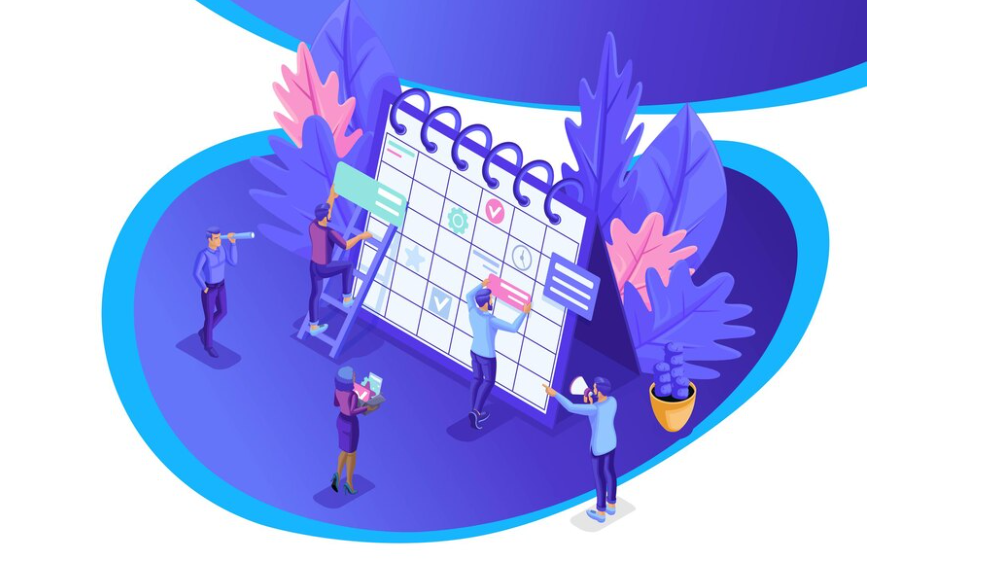
Let’s dive into the exciting world of event planning together and find out the sure-shot ways of becoming an event planner.
Who is an Event Planner?
An event planner is a professional responsible for coordinating and executing various aspects of events, ensuring everything runs smoothly. They handle logistics, vendor coordination, and details such as timelines and budgets to create successful and memorable occasions for clients.
What Does An Event Planner Do?
An event planner is responsible for coordinating and overseeing various aspects of events to ensure their success. Their key responsibilities include:

Pic Courtesy: Freepik
i) Venue Selection and Coordination
The first key responsibility involves venue selection and coordination, where the planner conducts thorough research to identify and secure suitable event locations. This includes negotiating contracts and collaborating with venue staff to manage logistics such as setup, audio-visual requirements, and overall layout, ensuring a seamless event experience.
To better explain this point, let’s consider an example. A corporate event planner, Sarah researches potential venues for a tech company’s product launch. She narrows down options based on capacity, location, amenities, and budget. After contacting venues for availability and pricing, Sarah reviews proposals and presents options to the client. Once a venue is chosen, she negotiates contract terms and coordinates logistics with venue staff for setup, catering, and audio-visual needs. Sarah maintains communication throughout the process, ensuring a seamless event execution for the client and their guests.
ii) Vendor Management
Vendor management is another critical aspect, as the event planner collaborates with various vendors such as caterers, florists, and decorators. Negotiating contracts and overseeing deliveries, the planner ensures that vendors align with client expectations, contributing to the overall theme and success of the event.
To explain this point, let’s consider Sarah’s case again. Sarah negotiates contracts with a catering company for food and beverages, ensuring menu options align with the client’s preferences and dietary restrictions. She coordinates with a florist to create arrangements that complement the event theme and decor. Additionally, Sarah works with a decorator to arrange furniture and lighting to enhance the ambiance. She oversees vendor deliveries and installations throughout the process, ensuring everything is executed seamlessly to contribute to the event’s success.
iii) Budget Planning and Management
Budget planning and management are integral to the event planner’s role. They create comprehensive budgets, allocating funds to different event components and meticulously tracking expenses to stay within the agreed-upon budgetary constraints. This financial planning ensures a cost-effective yet impactful event.
Let’s follow Sarah as she handles budget planning and management for the product launch. She creates a detailed budget outlining expenses for venue rental, catering, decor, audio-visual equipment, and other event necessities. She allocates funds based on priorities and negotiates with vendors to secure competitive pricing. Throughout the planning process, Sarah tracks expenses meticulously, updating the budget as necessary to ensure expenditures remain within the agreed-upon limits. Sarah ensures the event is cost-effective while delivering a memorable experience for the client and attendees by managing the budget effectively.
iv) Timeline and Logistics Coordination
Timeline and logistics coordination form the backbone of event planning. The planner develops and maintains a detailed timeline for the entire event, encompassing pre-event preparations, setup, and post-event activities. Coordinating logistics involves managing transportation, equipment setup, and guest arrivals to guarantee a smooth and well-organized flow of activities.
After planning the budget, Sarah creates a comprehensive timeline outlining tasks leading up to the event, including vendor coordination, venue setup, and guest registration. She ensures seamless logistics by arranging transportation for speakers and guests, coordinating equipment setup with AV technicians, and overseeing the flow of activities during the event. Meticulously managing the timeline and logistics helps Sarah ensure that everything runs smoothly from start to finish, contributing to the success of the product launch.
iv) Problem-Solving
The event planner promptly addresses unexpected issues, whether dealing with vendor challenges or unforeseen logistical issues. Their ability to implement quick and effective solutions ensures that any hiccups are resolved swiftly, contributing to the event’s overall success.
Going back to Sarah’s example, she encounters a last-minute AV equipment malfunction during the product launch. She quickly contacts the AV technician, arranges for a replacement, and communicates updates to the client and speakers. Sarah’s swift action ensures minimal disruption to the event, demonstrating her ability to resolve unforeseen issues effectively to contribute to the event’s overall success.
How to Become an Event Planner
An event planner’s multifaceted role involves a delicate balance of creativity, organization, and adaptability to create memorable and seamless experiences. Let’s explore these five steps to become a successful event planner.
1) Education and Training
Start your journey to becoming an event planner by obtaining a comprehensive education in the field. Consider enrolling in certificate programs, associate degrees, or bachelor’s degrees focusing on event planning, hospitality, or a related discipline. Timing is flexible; you can pursue education during or after high school, aligning with your personal preferences and career goals.
How-To:
Here’s how you can obtain the appropriate qualifications to become an event planner:
- Select Educational Institutions: Research and enroll in accredited institutions offering suitable courses, whether online or in-person. When choosing an educational institution, thorough research is essential. Accreditation ensures that the institution meets specific standards, guaranteeing the quality of education you receive. When deciding, consider factors such as the curriculum, faculty expertise, and alumni success stories.
- Consider Timing: The timing of your educational pursuit is a critical factor in your overall career trajectory. Depending on your preferences and circumstances, you can opt to pursue education immediately after high school or later. Some may choose to dive into event planning studies directly, while others may gain some work experience first. Consider your career goals, financial situation, and personal preferences when deciding the opportune time to pursue your education in event planning.
- Blend Theory with Practice: Theoretical knowledge gained in the classroom becomes truly valuable when applied to real-world situations. To bridge the gap between theory and practice, actively seek internships or entry-level positions in the field of event planning. These opportunities provide hands-on experience, allowing you to witness and contribute to the intricacies of event coordination.
#PlanningTip:
Stay curious and explore emerging trends in event planning. Attend workshops, webinars, or industry conferences to enhance your knowledge and stay ahead in this dynamic field.
2. Gain Practical Experience
Immerse yourself in event planning by acquiring hands-on, practical experience. Seek internships or entry-level positions within the industry to apply theoretical knowledge to real-world scenarios. Engage in various aspects of event coordination, from logistics to vendor management, under the guidance of experienced professionals.

How-To:
Here’s how you can gain practical experience:
- Internships: Internships serve as a crucial bridge between academic knowledge and practical application in the dynamic field of event planning. Actively explore opportunities with established event planning companies or departments within organizations. Seek positions that align with your specific interests and career goals. Many educational programs collaborate with industry partners to offer internship placements to students, providing a structured environment for gaining hands-on experience.
- Entry-Level Positions: Entry-level positions, such as event assistant or coordinator, offer a valuable pathway for individuals looking to kickstart their careers in event planning. These roles provide practical, on-the-ground experience while contributing directly to the execution of events. Responsibilities may include assisting with logistical arrangements, coordinating vendor interactions, and ensuring smooth event operations. Consider these positions opportunities to apply your theoretical knowledge in the real world.
- Networking: Networking is a cornerstone of career development in event planning. Attend industry events, conferences, and networking sessions to broaden your circle. Engage in meaningful conversations, seek advice, and learn from the experiences of established event planners. Building these relationships enriches your understanding of the field and opens doors to potential future opportunities.
#PlanningTip:
Don’t underestimate the value of small-scale events or volunteering opportunities. Even managing a community gathering or assisting in local events can provide valuable practical insights and help you hone your event planning skills.
3. Build a Diverse Portfolio
This step is crucial as it showcases everything you can offer. Feature various events, from weddings and corporate gatherings to community festivals, demonstrating your adaptability. Discuss your successful events by emphasizing positive client feedback, photos, and media coverage.
How-To:
Here’s how to build an outstanding portfolio:
- Document Your Work: Every event you organize is valuable to your professional portfolio. Document your work thoroughly by capturing high-quality photos and videos showcasing the event’s different aspects, from decor and setups to key moments. Additionally, gather testimonials from clients, vendors, and attendees. These testimonials serve as authentic feedback and can be powerful endorsements of your skills.
- Online Portfolio: Create an online portfolio or website to transform your documented work into a visual narrative. Ensure the design is visually appealing and reflects your style and professionalism. Showcase a diverse range of events to demonstrate your versatility. Include details about your role in each project, your challenges, and the innovative solutions you implemented. Use this platform to tell the story behind each event, giving potential clients insight into your approach, creativity, and problem-solving capabilities.
- Update Regularly: An online portfolio is a dynamic representation of your growth and capabilities. Regularly update it by adding the latest events you’ve organized. Highlight any advancements in your skills, new challenges you’ve successfully tackled, and innovative solutions you’ve implemented. Keeping your portfolio current reflects your evolving expertise. It also demonstrates your commitment to staying active and relevant in the ever-changing event planning landscape.
#PlanningTip:
Consider offering your services for discounted rates or pro bono for your initial projects. While this may seem like a sacrifice, the diverse portfolio you build will be invaluable for attracting future clients and showcasing your capabilities.
4. Develop Strong Networking Skills
Cultivate meaningful professional connections to move your event planning career. This means establishing genuine connections with professionals in the event industry, from vendors to fellow planners. Participate in industry conferences, workshops, and local meet-ups to expand your network.
How-To:
Here are a few methods to engage in effective networking:
- Engage in Conversations: Networking is not just about exchanging business cards; it’s about building genuine connections. Approach networking events with a friendly and open attitude. Be proactive in initiating conversations by introducing yourself, asking about others’ experiences, and sharing your insights. Actively listen to what others say and show genuine interest in their stories.
- Utilize Social Media: In the digital age, social media is a powerful tool for expanding your professional network. Utilize platforms like LinkedIn to connect with fellow event planners, vendors, and industry professionals. Craft a professional and inviting profile showcasing your skills and experiences. Actively participate in discussions within relevant groups to share your insights, learn from others, and establish your presence in the online event planning community. Engaging on social media platforms provides an additional avenue for building connections beyond traditional networking events.
- Follow-up: Follow-up is a crucial aspect of effective networking. After meeting someone at an event or having a business meeting, send a personalized and friendly follow-up email. Express gratitude for the conversation, reference specific points discussed, and convey your interest in maintaining the connection. A thoughtful follow-up can set the stage for future collaborations or opportunities.
#PlanningTip:
Networking is a two-way street. When possible, offer assistance or insights to your network. Building a mutually beneficial relationship can lead to valuable opportunities and collaborations in the future.
5. Establish an Online Presence
As an event planner, you can boost your visibility and reach potential clients by creating a strong online presence. Develop a user-friendly website showcasing your services, portfolio, and contact information. Remember to create and maintain profiles on platforms like Instagram, Facebook, and LinkedIn to connect with a broader audience.
How-To:
Here’s how you can show yourself in the market:
- Website Creation: Your website is often the first interaction potential clients have with your business, making its design crucial. If you’re tech-savvy, website builders like Wix or Squarespace offer user-friendly templates to create a website. Alternatively, hiring a professional web designer ensures a polished, customized site. Focus on visuals that align with your personal style and expertise in event planning. Include informative sections about your services, portfolio, and contact details, creating a seamless and engaging user experience.
- Consistent Branding: Branding is the visual identity that sets you apart. Ensure your branding remains consistent across all online platforms, creating a cohesive and recognizable image. Use professional photos that showcase your work and team. Craft concise and engaging content that communicates your expertise and approach. Consistency builds trust and strengthens your brand, leaving a lasting impression on visitors.
- Regular Updates: An outdated website can create a negative impression. Regularly update your site with new projects, showcasing your evolving skills and capabilities. Feature client testimonials to build credibility. Stay current with industry trends and incorporate relevant content.
#PlanningTip:
Encourage client reviews and testimonials on your website and social media. Positive feedback from past clients builds trust and credibility, influencing potential clients to choose your services.
Skills Needed to Become an Event Planner
Becoming a successful event planner requires diverse skills to navigate the dynamic and demanding nature of the profession. Here are the critical skills needed to excel in the field:

Pic Courtesy: Freepik
1. Creativity
Successful event planners stand out by bringing fresh and innovative ideas to events. Their creativity allows them to design unique experiences, incorporate novel themes, and tailor events to meet clients’ needs and preferences.
For example, if a client requests a corporate event with a “futuristic” theme, a creative event planner will envision innovative decor elements like holographic displays, LED lighting resembling a sci-fi setting, and high-tech gadgets for interactive engagement. He will turn a standard corporate gathering into a futuristic experience that leaves a lasting impression.
2. Problem-Solving Abilities
Events can be unpredictable, and challenges may arise unexpectedly. Event planners must possess quick-thinking and problem-solving skills to address issues and ensure the event runs smoothly and promptly.
For example, a wedding is taking place. The florist suddenly runs out of the chosen flowers. A skilled event planner will quickly assess the situation, propose alternative flower options that maintain the desired aesthetic, and ensure that the last-minute change seamlessly integrates into the overall design. He will save the day without causing stress for the couple or guests.
3. Negotiation Skills
Negotiating contracts with vendors, venues, and other service providers is standard in event planning. Strong negotiation skills help to ensure that the event stays within budget while meeting client expectations.
For example- If an event planner has to organize a charity gala on a limited budget, he’ll have to negotiate with vendors for discounted rates, secure sponsorships from local businesses, and strategically allocate resources.
4. Flexibility and Adaptability
Events may deviate from the original plan due to unforeseen circumstances. Being flexible and adaptable allows event planners to navigate changes smoothly, adjusting plans and solutions to ensure the event’s success.
For example- There’s an outdoor wedding where unexpected rain changes plans. An adaptable event planner will quickly shift the ceremony to an elegant indoor space, coordinate with the venue, and ensure that the bride, groom, and guests experience a flawless and stress-free event despite the unforeseen weather.
5. Attention to Detail
Small details can significantly impact an event’s overall success. A keen eye for detail helps event planners create polished and memorable experiences, from décor elements to the timing of activities.
For example- There’s a high-profile corporate product launch. An event planner will have to meticulously plan every detail, from the promotional materials’ color scheme to the presentations’ timing. The attention to detail will ensure a cohesive and polished event where even the smallest elements will contribute to an impressive brand showcase.
6. Networking
Building and maintaining a network of reliable vendors and industry contacts is vital. Strong networking skills help event planners access resources, stay informed about industry trends, and ensure a smooth collaboration flow with various professionals.
A well-connected event planner can easily hire a renowned keynote speaker for a conference. Their network will allow them to access top-tier vendors, ensuring that the event benefits from the expertise of respected professionals and provides attendees with an enriching experience.
How to Get Your First Client as an Event Planner
Here’s a captivating roadmap to transform potential into a resounding “yes!” –

1. Craft an Irresistible Online Presence
Create a dazzling website showcasing your portfolio, emphasizing your unique style and past successes. Imagine your website as the grand entrance to an exclusive event – make it inviting, visually stunning, and impossible for clients to resist.
2. Showcase Your Expertise on Social Media
Establish a vibrant social media presence. Share captivating posts about event trends, behind-the-scenes glimpses of your planning process, and success stories. Picture social media as your red carpet – strut your stuff and let potential clients glimpse your star quality.
3. Offer Irresistible Packages or Promotions
Launch introductory packages or limited-time promotions to entice your first clients. Picture this as the opening act of a blockbuster event – give them a taste of the VIP treatment, making it too tempting to pass up.
4. Network Like a Pro
Attend local events, join professional organizations, and mingle with potential clients. Networking is your backstage pass to the event planning world – shake hands, exchange business cards, and let your charm leave a lasting impression.
5. Leverage Word-of-mouth
Encourage friends, family, and acquaintances to spread the word about your budding event-planning prowess. Imagine this as the viral buzz before a blockbuster movie release – let the excitement build, and soon, you’ll have a queue of eager clients waiting for their moment in the spotlight.
6. Collaborate with Local Businesses
Partner with local businesses, such as florists, photographers, or catering services. It’s like creating a dream team for your event – together, you can offer comprehensive services, and their endorsement can be the golden ticket to winning over clients.
7. Volunteer for Events
Offer planning services for community events, charities, or local festivals. It’s akin to a live performance – let your skills shine in the spotlight, and as the applause grows, so will your reputation as a go-to event planner.
8. Engage in Online Platforms
Join event planning forums, online communities, and freelancing platforms. Think of it as the virtual dance floor – showcase your moves, share your expertise, and let potential clients discover your rhythm.
Remember, getting your first client is like orchestrating the perfect event – it takes creativity and strategic planning. Embrace the excitement, and soon you’ll be in the limelight, curating unforgettable client experiences.
Key Takeaway
Becoming an event planner is an exciting venture that blends creativity, organization, and people skills. Each step contributes to your success in this dynamic field, from acquiring the proper education and gaining practical experience to building a diverse portfolio and mastering networking. Remember, your online presence and consistent branding are vital in showcasing your unique style and attracting clients.
As you enter the world of event planning, stay curious, adapt to industry trends, and embrace every opportunity to learn and grow. Your passion and dedication will set you apart, whether coordinating corporate events or community gatherings.
Ready to dive in? If you want to stay up-to-date with all the latest information about the event industry, visit our site— Eventible, your go-to resource for staying informed, inspired, and connected. Let’s make every event unforgettable!




Comments are closed.